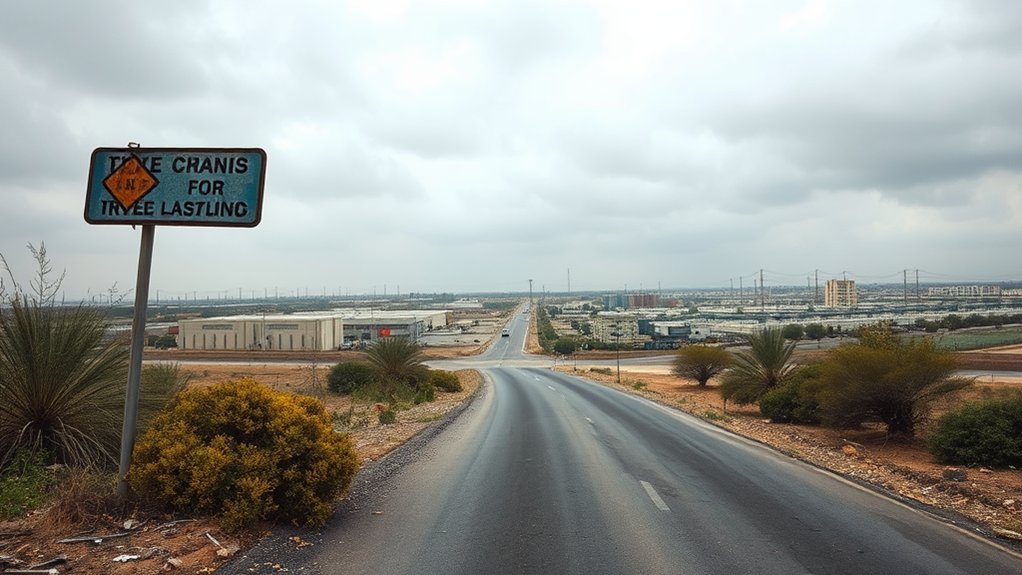When operating in the IFZA Free Zone, avoid these common mistakes. First, inadequate market research can lead to a misunderstanding of customer needs and preferences. Make certain your business activities align with IFZA's allowed activities to prevent penalties. Ignoring licensing requirements can cause operational disruptions, so always make sure you've got the correct licenses. Underestimating financial planning will leave you unprepared for hidden costs. Finally, stay adaptable to changing regulations and market trends. Keeping these points in mind will help you establish a successful business in the IFZA. More insights can enhance your understanding of this important topic.
Inadequate Market Research

While you might be enthusiastic to launch your business in the IFZA Free Zone, inadequate market research can derail your plans before you even start. Proper market research is vital for aligning your business offerings with local demand. Without it, you risk misjudging what customers actually want, which can jeopardize your profitability and sustainability.
If you fail to analyze your competitors within the IFZA Free Zone, you might miss out on valuable opportunities to differentiate your products and services. This oversight could leave you vulnerable to market saturation. Furthermore, without a clear understanding of your target audience's preferences and behaviors, you could invest in marketing strategies that fail to resonate. As a result, your customer acquisition efforts may fall flat.
In addition, insufficient market research can cause you to overlook emerging trends and shifts in consumer needs. This can lead to stagnation, preventing your business from innovating effectively in the dynamic UAE market. Finally, poorly executed market research can lead to inaccurate financial projections. If you underestimate costs or overestimate potential revenue based on flawed assumptions, it can have dire consequences for your business.
To avoid these pitfalls, prioritize thorough market research. Take the time to gather relevant data and analyze it thoroughly. Understanding the landscape in the IFZA Free Zone is essential for making informed decisions. It'll set a strong foundation for your business and improve your chances of success in this vibrant market. Additionally, recognizing opportunities in cloud computing solutions can further enhance your competitive edge.
Choosing the Wrong Jurisdiction
Choosing the wrong jurisdiction can substantially impact your business's success. You need to analyze the advantages of IFZA, understand compliance requirements, and align your choice with your long-term business goals. If you overlook these factors, you might face unnecessary challenges and limit your growth potential. Additionally, considering the benefits of 100% exemption from corporate and personal taxes can further enhance your decision-making process.
Jurisdictional Advantages Analysis
When selecting a jurisdiction for your business, overlooking the unique advantages of the International Free Zone Authority (IFZA) can lead to costly mistakes. The IFZA Free Zone offers considerable jurisdictional advantages that can enhance your business's potential. For instance, you benefit from 100% foreign ownership, allowing you to maintain full control without a local sponsor. This is a major perk compared to mainland jurisdictions.
Additionally, the setup process in IFZA is streamlined, letting you form a company in as little as 24 hours. This is ideal if you need to start operations quickly. The tax benefits are also notable, with zero corporate tax and no import/export duties, which can greatly improve your profit margins. Furthermore, the expert consultants available can help simplify complex regulations, ensuring you take full advantage of the business setup services offered.
Here's a quick comparison:
| Advantage | IFZA Free Zone | Other Jurisdictions |
|---|---|---|
| Ownership | 100% Foreign Ownership | 51% Local Ownership |
| Setup Time | 24 Hours | Varies (days to weeks) |
| Tax Benefits | Zero Corporate Tax | Higher Taxes |
Compliance Requirements Understanding
Understanding compliance requirements is key to reaping the benefits of the IFZA Free Zone. When you choose to operate here, it's essential to grasp the specific regulations tied to your business activities. The IFZA allows 100% foreign ownership, but that comes with responsibilities. Selecting the right legal structure for your business is imperative. You need to guarantee that your activities are permitted within this jurisdiction to avoid penalties.
Engaging in unlicensed activities can lead to fines and disruptions in your operations. Compliance with local laws is not just a formality; it's critical for maintaining smooth business operations. You must acquire the appropriate trade licenses based on the activities you plan to undertake. This guarantees you're aligned with the IFZA's legal framework.
Misunderstanding these compliance requirements can hinder your trading capabilities and create unnecessary complications. By fully understanding the implications of your business choices in the IFZA Free Zone, you can maximize tax benefits and navigate regulatory requirements effectively. Keep these factors in mind to guarantee your business thrives within this advantageous environment. Additionally, being aware of JAFZA's regulations and guidelines can further enhance your understanding of compliance in free zones.
Long-term Business Goals
Selecting the right jurisdiction is essential for achieving your long-term business goals, especially when contemplating the IFZA Free Zone. Choosing IFZA without a clear understanding of your business objectives can restrict your future expansion and operational flexibility. Here are three key points to reflect on:
- Market Focus: IFZA is excellent for businesses targeting international trade or service industries. However, if you aim to engage with local UAE markets, a mainland jurisdiction might offer better advantages.
- Ownership Implications: While 100% foreign ownership in IFZA is appealing, verify your business model aligns with market access and distribution channels. Misalignment can hinder your growth.
- Cost-Benefit Evaluation: Don't overlook the financial implications of operating in IFZA. Weigh competitive fees and tax incentives versus the need for a broader operational reach.
Additionally, understanding the distinct regulatory requirements of different business structures in Dubai is crucial for making an informed choice. Your long-term business goals should guide your choice of jurisdiction. If you select IFZA without planning for potential market shifts, you may face costly relocations or restructuring down the line. Always evaluate your options thoroughly to support your business's future needs.
Misalignment of Business Activities

Misalignment of business activities can spell trouble for your operations in the IFZA Free Zone. It's vital to guarantee that the activities you choose align with the permitted list established by IFZA. Engaging in unlicensed activities can lead to penalties and disrupt your operations considerably. Each business activity requires specific licenses, and failing to obtain the correct one can result in legal complications and fines that could have been avoided.
To avoid the misalignment of business activities, you need to carefully define and authorize each activity within your business license. If your activities are not clearly defined, it can hinder your ability to expand or diversify services. Understanding the nuances of IFZA's allowed activities is fundamental. Misinterpretations can lead to costly mistakes and delays that affect your bottom line.
Regularly reviewing and updating your licensed activities is essential for maintaining compliance with any changes in regulations or shifts in your business objectives. This practice helps you stay proactive and avoid potential issues down the line. Keeping your business aligned with IFZA's requirements not only protects you from legal troubles but also positions your company for growth.
Ignoring Licensing Requirements
When you overlook licensing requirements in the IFZA Free Zone, you risk serious consequences for your business. Failing to obtain the appropriate trade license can lead to operational shutdowns and considerable financial penalties. Each business activity requires a specific license. Engaging in activities outside your licensed scope can result in legal repercussions that may harm your reputation and operations.
To avoid these issues, keep these key points in mind:
- Obtain the Correct License: Verify that your chosen license aligns directly with your operational activities. Any mismatch can lead to compliance issues and potential fines.
- Complete Applications Thoroughly: The licensing process involves submitting detailed documentation. Incomplete applications can delay approval and extend your startup timeline. Take the time to gather all necessary materials before submission.
- Regularly Review and Renew Licenses: Operating with an expired license can have serious legal consequences. Regularly check your licensing status and renew licenses on time to prevent business disruptions.
Underestimating Financial Planning

Many entrepreneurs underestimate the importance of thorough financial planning when establishing a business in the IFZA Free Zone. This oversight can lead to notable financial challenges down the road. It's vital to recognize that financial planning encompasses much more than just initial setup costs.
Here's a quick overview of key financial aspects to take into account:
| Cost Category | Estimated Costs (AED) |
|---|---|
| Licensing Fees | 11,000 – 30,000 |
| Office Rent (Flexi-desk) | Starting at 15,000/year |
| Visa Application & Renewal | 3,000 – 5,000 each |
Underestimating costs is a common pitfall. Many new business owners fail to account for ongoing operational expenses, such as office rent and visa fees. These costs can add up quickly and lead to unexpected financial strain. Even with the IFZA's 0% corporate tax rate, it's important to plan for potential tax implications to avoid penalties from miscalculating applicable fees.
A thorough financial plan should include regular reviews and budget adjustments. The market in Dubai can be dynamic, and costs may fluctuate greatly. By staying proactive with your financial planning, you can guarantee your business remains sustainable and capable of maneuvering any financial hurdles that may arise.
Incomplete Documentation
Failing to provide complete documentation during the registration process can considerably delay your ability to obtain the necessary licenses and permits in the IFZA Free Zone. Incomplete documentation can lead to application rejections, causing frustration and wasted time. To avoid these pitfalls, make certain you have all essential documents prepared and submitted correctly.
Here's a quick checklist of essential documents you need for your business setup in IFZA:
- A completed application form: This is your first step, and it's vital that every section is filled out accurately.
- Proof of identity: Make sure you submit valid identification, like a passport, that hasn't expired. Outdated documents can lead to penalties.
- A solid business plan: This helps demonstrate your business's viability and can prevent processing issues.
It's also important that all documentation is submitted in English or Arabic. Ignoring this requirement can create complications in the licensing process. Always double-check your submitted paperwork to guarantee accuracy. Errors can extend the approval timeline and may incur additional costs for resubmission.
Non-Compliance With Local Laws

Non-compliance with local laws in the IFZA Free Zone can have severe consequences for your business, including hefty fines or even suspension of operations. To avoid these risks, you need to understand the legal structure governing your activities. This includes securing the appropriate trade license for your specific business operations. Without the right licenses, you could face legal repercussions that may hinder your growth.
Additionally, businesses must comply with tax regulations. This means being aware of any corporate tax obligations that apply to your operations. Ignoring these tax requirements can lead to audits and financial penalties that can impact your bottom line.
It's also essential to maintain up-to-date documentation and licenses as per IFZA guidelines. Non-compliance in this area can result in delays that disrupt your business operations. If your documents are outdated, you may encounter challenges that could have been avoided with proper maintenance.
While adhering to local laws, you should also be mindful of your employees' rights. Although this topic will be covered later, it's worth noting that compliance with labor laws is part of the broader legal landscape you must navigate.
Overlooking Employment Regulations
When maneuvering the complexities of running a business in the IFZA Free Zone, overlooking employment regulations can lead to serious repercussions. It's essential to understand and comply with UAE labor laws to avoid fines and disruptions. Ignoring these regulations can create compliance gaps that put your business at risk. Here are three key areas to focus on:
- Employment Contracts: You must provide clear and documented employment contracts. These should outline roles, responsibilities, and terms of employment to protect both you and your employees.
- Visa Requirements: Understanding specific visa requirements for your employees is important. You need to secure the appropriate number of work permits based on your workforce size and structure, ensuring that everyone is legally permitted to work.
- Health Insurance: Providing health insurance is not just good practice; it's mandated by UAE law. This is a significant aspect of your employment package that cannot be overlooked.
Regular audits of your employment practices and contracts can help you identify compliance gaps. Staying informed about labor laws is crucial for your business's success. Non-compliance can lead to substantial fines and operational issues, disrupting your daily activities. By prioritizing these regulations, you can create a stable environment for your employees and a more successful business overall. Remember, staying compliant isn't just about avoiding penalties; it's about fostering a professional and fair workplace.
Skipping Professional Advice

When setting up in the IFZA Free Zone, skipping professional advice can lead to serious mistakes. Relying on your own research might leave you unaware of important regulations, which could result in costly penalties. By consulting with experts, you'll guarantee compliance and make informed decisions that strengthen your business strategy.
Importance of Expert Guidance
Though it might seem tempting to navigate the complexities of setting up in the IFZA Free Zone on your own, skipping professional advice can lead to significant pitfalls. Expert guidance is vital to guarantee you understand the legal structure and compliance requirements necessary for a successful business launch.
Here are three key reasons why seeking professional help is essential:
- Understand Licensing Requirements: Professionals can help you interpret the specific licensing needs. Misunderstanding these can result in costly delays or penalties.
- Tailored Insights: Local experts provide valuable insights into tax incentives and benefits like 100% foreign ownership that you might overlook without guidance.
- Streamlined Documentation: Engaging a business setup consultant can simplify the documentation process. This helps avoid incomplete or incorrect submissions that can hinder your start.
Risks of Self-Navigation
Maneuvering the IFZA Free Zone without professional advice can lead you down a treacherous path filled with potential pitfalls. Many businesses misinterpret regulations, which can result in legal penalties or operational disruptions. When you self-navigate, you might overlook specific licensing requirements unique to the IFZA. This oversight can lead to delays or even rejections of your business applications.
Additionally, the intricacies of tax compliance in the IFZA are often underestimated. Professional guidance is important to avoid costly mistakes related to corporate tax registration and VAT obligations. Without expert consultation, you may fail to take advantage of tax incentives and benefits offered by the IFZA. This oversight could limit your competitive edge in the market.
Relying solely on online resources poses another risk. These resources can be outdated or incorrect, making it essential to engage with local professionals who are up-to-date with current regulations and practices in the IFZA. To guarantee a smooth business setup process, it's crucial to seek professional advice. By doing so, you can avoid common mistakes and navigate the complexities of the IFZA Free Zone effectively.
Neglecting Branding Strategy
Neglecting your branding strategy can greatly hinder your business's success in the competitive IFZA Free Zone. With numerous startups operating in similar sectors, having a well-defined branding strategy is essential for standing out. If you overlook this aspect, you may miss out on effectively engaging your target audience. This can lead to lower brand recognition and decreased customer loyalty.
Here are three key elements to reflect on in your branding strategy:
- Consistent Messaging: Confirm that your brand message is uniform across all platforms. This includes digital marketing and your physical presence. Consistency builds credibility and trust with potential customers.
- Cultural Insights: Utilize local cultural insights in your branding efforts. Understanding the diverse consumer base in Dubai, where many are expatriates and tourists, can enhance your brand's resonance. Tailoring your approach to meet cultural preferences can set you apart.
- Regular Evaluation: Regularly assess and adapt your branding strategy based on market trends and consumer feedback. The dynamic business environment of the IFZA Free Zone requires you to stay relevant and competitive.
Business owners who focus on these elements will find it easier to establish a strong brand presence. Remember, a well-thought-out branding strategy not only supports your corporate bank account but also fosters long-term relationships with your customers. Don't underestimate the power of branding in your business journey.
Poor Location Selection

When selecting a location within the IFZA Free Zone, overlooking accessibility can severely impact your business operations. A location that's hard to reach can hinder customer visits and make commuting difficult for employees. This can lead to decreased productivity and limit your growth potential. You should also consider visibility and foot traffic. A spot with limited exposure may reduce your brand recognition and customer engagement, directly affecting your revenue.
Failing to evaluate proximity to key amenities, such as transportation hubs and suppliers, can escalate your operational costs. If your business is located far from essential services, you may face inefficiencies that eat into your profits. Additionally, understanding the competitive landscape in your chosen area is vital. If the market is oversaturated or lacks demand for your products or services, you may struggle to attract customers.
Ignoring local infrastructure developments and future urban planning can lead to missed opportunities. Changes in the area might shift market dynamics, impacting your business's viability. You need to stay informed about any upcoming projects or urban plans that could affect your location.
Ignoring Cultural Considerations
While you focus on the operational aspects of your business in the IFZA Free Zone, overlooking cultural considerations can lead to missed opportunities and misunderstandings. The cultural diversity in Dubai, with over 200 nationalities, greatly impacts business interactions and customer preferences. Ignoring local customs can hinder your success. Here are three key areas to take into account:
- Local Etiquette: Understanding local customs, such as greeting with "As-salamu alaykum," can create a positive first impression. It shows respect and helps build rapport in business meetings.
- Islamic Practices: Being aware of Islamic traditions, like Ramadan, is essential. Business hours may shift, and recognizing fasting practices can improve relationships with local partners and clients. Respecting these traditions demonstrates your commitment to the community.
- Culturally Sensitive Marketing: Your marketing strategies should reflect local values. Using imagery and messaging that resonate with the diverse audience in the IFZA can enhance brand acceptance. Ignoring this can alienate potential customers and limit your reach in the market.
Lack of Networking Opportunities

Not taking advantage of networking events in the IFZA Free Zone can limit your access to important local contacts and partnerships. Engaging in workshops and seminars can help you connect with other entrepreneurs and investors who could boost your business. Building these relationships is essential for gaining insights into market trends and improving your strategic decisions.
Importance of Networking Events
How can businesses thrive without forging meaningful connections? Networking events in the IFZA Free Zone are vital for building those connections. They offer opportunities to meet potential partners, investors, and clients, which can lead to valuable business relationships. Without participating in these events, you risk missing out on essential insights about market trends and local customer preferences.
Here are three key benefits of attending networking events:
- Enhanced Visibility: Being active in networking events increases your presence in the local market. This visibility helps differentiate your business from competitors.
- Stay Informed: Regular attendance keeps you updated on regulatory changes and industry developments that may affect your operations in the Free Zone.
- Access to Mentorship: Networking can connect you with established entrepreneurs who can offer guidance and support. This mentorship is vital for maneuvering the complexities of business setup and growth.
Building Local Partnerships
Forging local partnerships is key to maneuvering the business landscape in the IFZA Free Zone. Building local partnerships opens doors to valuable market insights and resources that can greatly enhance your operations and growth potential. Engaging with local businesses allows you to navigate regulatory requirements more easily, providing a support system to overcome operational challenges.
Networking events and industry associations in Dubai present excellent opportunities to connect with local stakeholders. By participating actively in these events, you can establish relationships that might lead to funding, mentorship, and strategic alliances. These connections are essential for business expansion in the competitive Dubai market.
However, if you overlook networking opportunities, you risk missing out on critical collaborations that can boost your credibility and visibility. Engaging in the local business community not only enhances your reputation but also positions you as a trustworthy player in the market.
To maximize your chances of success, make it a priority to attend networking events and seek out local partnerships. The relationships you build will be invaluable as you navigate the complexities of doing business in the IFZA Free Zone.
Inadequate Risk Assessment
When businesses in the IFZA Free Zone overlook risk assessment, they open themselves up to a host of operational challenges. Inadequate risk assessment can lead to serious issues like regulatory non-compliance, which may result in fines or even business license revocation. To avoid these pitfalls, it's essential to identify potential risks before they escalate.
Here are three key areas to focus on during your risk assessment:
- Market Fluctuations: Failing to analyze changing market demands can hinder your financial stability. Understanding these shifts is fundamental for growth in the competitive Dubai market.
- Supply Chain Disruptions: Neglecting to assess risks related to supply chain management might cause delays in operations. These delays can impact customer satisfaction and harm your business's reputation.
- Employee Management: Overlooking risks associated with labor laws can lead to costly legal disputes. The UAE has strict regulations, and non-compliance can result in significant penalties.
A thorough risk assessment framework should include both internal and external factors. By doing so, you prepare your business for economic shifts and industry changes. This proactive approach helps safeguard against unforeseen challenges, enabling smoother operations. Remember, taking the time to perform a detailed risk assessment can save you from costly mistakes and guarantee long-term success in the IFZA Free Zone.
Failure to Adapt to Changes

Adapting to changes in the business landscape is fundamental for your success in the IFZA Free Zone, as failing to do so can leave you vulnerable to penalties and loss of relevance. Businesses often make the mistake of ignoring the evolving regulations set by the free zone authority. Staying updated on these guidelines is essential to avoid non-compliance, which can lead to penalties or even license revocation.
It's also important to adapt to market trends, such as changes in consumer preferences or new technologies. If you don't adjust your marketing strategies and branding based on customer feedback, you might struggle to engage your target audience effectively. This can hinder your business's growth and competitiveness in the dynamic Dubai market.
Moreover, regularly reviewing and updating your operational procedures is fundamental to align with new laws or economic conditions. Doing so can help you avoid unnecessary disruptions that may impact your operations. You must also be proactive in understanding changes in tax regulations or corporate policies within the UAE to maintain compliance and prevent financial repercussions.
Misjudging Operational Costs
Many entrepreneurs misjudge operational costs in the IFZA Free Zone, often leading to unexpected financial strain. It's vital to have a clear understanding of what these costs entail, as underestimating them can disrupt your business's cash flow. Here are three common areas where costs can add up quickly:
- Licensing Fees and Office Rent: The cost of leasing office space ranges from AED 15,000 to AED 50,000 annually. This depends on size and location, so thorough budgeting is necessary from the start.
- Employee Expenses: When hiring local staff, consider salaries, benefits, and compliance with UAE labor laws. These can greatly impact your operational costs and should be factored into your initial budget.
- Hidden Costs: Many businesses overlook renewal fees, administrative charges, utility bills, internet services, and office supplies. These hidden costs can accumulate quickly, leading to cash flow issues if not accounted for.
It's important to regularly review your operational costs and adjust your budget as needed. By understanding all potential expenses and planning for them, you can avoid financial strain and keep your business running smoothly in the IFZA Free Zone. Taking the time to research and accurately estimate costs will pay off in the long run. Remember, budgeting isn't just a one-time task; it's an ongoing process that requires attention and adjustment as your business grows.
Disregarding Tax Regulations

When running a business in the IFZA Free Zone, you can't overlook tax regulations. It's crucial to understand your VAT obligations and guarantee you're compliant with corporate tax requirements. Keeping accurate records will help you avoid penalties and maintain your business's good standing.
Understanding VAT Obligations
Understanding VAT obligations is vital for businesses operating in the IFZA Free Zone, as failing to comply can lead to significant penalties. To guarantee compliance and avoid common mistakes, here are three key points to reflect on:
- VAT Registration: You must register for VAT with the Federal Tax Authority (FTA) if your taxable turnover exceeds AED 375,000. Not doing so can result in serious fines.
- Filing Returns: VAT returns should be submitted quarterly. It's imperative to keep accurate records of all transactions to support your VAT filings. The FTA conducts audits, and having proper documentation is vital for compliance.
- Staff Education: Educate your staff about VAT obligations. Misunderstanding VAT can lead to costly errors and financial miscalculations. Remember, VAT is charged on sales, while corporate tax applies to profits.
Avoiding these common mistakes will help you navigate your VAT obligations effectively. By prioritizing compliance, you protect your business from unnecessary penalties and maintain a smooth operation within the IFZA Free Zone.
Corporate Tax Compliance
Maneuvering VAT obligations is just one aspect of operating a business in the IFZA Free Zone; corporate tax compliance is equally important. You must register for corporate tax if your taxable income exceeds AED 375,000, as the UAE government mandates this registration. The corporate tax rate is set at 9%, making it vital to accurately calculate your taxable income. Failing to register can lead to penalties, including fines and even legal action.
Timely compliance is not just a recommendation; it's a necessity. If you disregard tax regulations, you risk losing your business license and permits, which can halt your operations in the IFZA. Additionally, maintaining proper financial records is essential. The Federal Tax Authority may conduct audits, and you'll need to demonstrate compliance with your tax obligations during these checks.
Record-Keeping Essentials
Maintaining accurate financial records is vital for your business in the IFZA Free Zone, especially if you want to avoid complications during tax audits. Good record-keeping guarantees compliance with UAE regulations and helps you track your financial health.
To keep your records in order, consider these three essentials:
- Document All Transactions: Keep detailed records of every income and expense. This includes invoices, receipts, and bank statements.
- Retain Financial Documents: The UAE requires businesses to hold onto financial documents for a minimum of five years. This retention is important for transparency and accountability.
- Implement a Systematic Process: Create a structured record-keeping system for VAT transactions. This will help you accurately file tax returns and avoid issues related to overpayment or underpayment of taxes.
Not Utilizing Free Zone Benefits
While many businesses in the IFZA Free Zone enjoy considerable advantages, they often miss out on fully utilizing these benefits. One of the common mistakes made is not leveraging the 100% foreign ownership privilege. You should explore various permissible business activities that align with your objectives to maximize this advantage.
Another key benefit is the zero percent corporate tax for 50 years. However, some companies overlook the importance of proper registration and compliance to maintain these tax benefits. Ensuring that all paperwork is in order is essential for enjoying this financial perk.
Additionally, you can benefit from 100% repatriation of profits and capital, but many businesses fail to take advantage of this feature. This oversight can limit your financial flexibility and growth potential.
Moreover, the IFZA offers a streamlined process for obtaining multiple visas, yet companies often do not apply for the maximum number allowed. This restricts your workforce potential and can hinder your business's growth.
Lastly, many businesses in the IFZA neglect the robust infrastructure and networking opportunities available within the free zone. Engaging with these resources can considerably enhance your market reach and operational efficiency.
Frequently Asked Questions
How Can I Effectively Conduct Market Research in IFZA Free Zone?
To effectively conduct market research in the IFZA Free Zone, start by using market segmentation strategies to identify your target audience. Next, apply competitor analysis techniques to understand your rivals and their offerings. Gather consumer behavior insights through surveys and interviews to learn what drives your potential customers. Combine these approaches to create a thorough view of the market, ensuring your business decisions are informed and aligned with local demands.
What Are the Benefits of Networking Within the IFZA Community?
Networking within the IFZA community offers valuable benefits. For example, attending networking events can connect you with potential partners and clients. This fosters collaboration opportunities that lead to innovative projects or joint ventures. Furthermore, community support is essential; when you face challenges, fellow business owners can provide advice and resources. Building relationships in this environment enhances your business visibility and opens doors to new possibilities, ultimately contributing to your success.
How Do I Ensure Compliance With Local Laws in IFZA?
To guarantee compliance with local laws in IFZA, you need effective compliance strategies. Start by gathering all necessary legal documentation required for your business. Regularly review regulatory updates to stay informed about changes in laws that may affect your operations. Consider consulting with legal experts familiar with IFZA regulations. Keeping accurate records and implementing a compliance checklist can also help you maintain adherence to all legal requirements and avoid potential issues.
What Resources Are Available for Understanding Cultural Considerations in Business?
Did you know that over 70% of business failures can be traced back to poor cultural awareness? To enhance your understanding of cultural considerations in business, explore resources like local business networks, cultural training programs, and online courses. These platforms offer insights into business etiquette and cross-cultural communication. You'll find that recognizing cultural differences can greatly improve your interactions and help you build stronger relationships in diverse environments.
How Can I Leverage Free Zone Benefits for My Business Growth?
To leverage free zone benefits for your business growth, focus on business incentives offered in these zones. You can utilize tax exemptions and reduced operational costs as part of your growth strategies. It's crucial to integrate these benefits into your financial planning. By doing so, you'll maximize profitability and create a competitive edge. Regularly review your strategies to guarantee they align with the evolving opportunities within the free zone environment.
Conclusion
Avoiding common mistakes in the IFZA free zone can greatly enhance your business's chances for success. Have you considered how these errors could impact your growth? By conducting thorough market research, choosing the right jurisdiction, and understanding licensing needs, you set a solid foundation. Additionally, careful financial planning and awareness of operational costs are essential. Remember, taking full advantage of free zone benefits can lead to significant gains. Don't let avoidable mistakes hold your business back.







